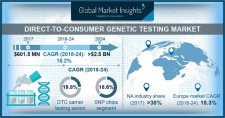Direct-to-Consumer Genetic Testing Market Will Surge at 18%+ CAGR Up to 2024

SELBYVILLE, Del., February 26, 2019 (Newswire.com) - China direct-to-consumer genetic testing market was valued at USD 29.1 million in 2017, as a result of increasing per capita income, healthcare expenditures and awareness regarding DTC genetic test. Rising awareness regarding availability of technologically advanced DTC genetic tests amongst population in China will positively influence the market growth. Furthermore, growing popularity for prenatal and cancer DTC tests along with presence of significant number of DTC genetic test suppliers will positively impact the industry growth.
Global Direct-to-Consumer Genetic Testing Market will surpass USD 2.5 billion by 2024; according to a new research report by Global Market Insights, Inc. Growing incidences of genetic and rare disorders worldwide coupled with wide applications of direct-to-consumer genetic testing in early detection and prevention of oncology as well as other genetic diseases will drive the DTC genetic testing market growth in the coming years. Rising awareness among patients pertaining to early disease diagnosis will result in timely treatment and reduced mortality rate. Additionally, technological innovations in direct-to-consumer genetic testing to offer enhanced efficiency, high sensitivity and accuracy will serve to be a significant impact rendering factor. Moreover, increasing adoption of carrier testing at a very early stage of pregnancy will further augment the business growth during forecast period.
Nutrigenomics segment will grow at 20.3% from 2018 to 2024 Growing preference for nutrigenomics tests amongst the adult population should propel business growth over forecast timeframe. Nutrigenomic tests provide information regarding the patient's metabolic requirements. Every individual has a unique set of genes that influence the metabolism. Defects in the metabolism due to alteration in genes may lead to various genetic metabolic and endocrine disorders that will positively influence the demand for nutrigenomic tests escalating segmental growth.
Request for a sample of this research report @ https://www.gminsights.com/request-sample/detail/3033
Single Nucleotide Polymorphism (SNP) segment held 49.5% revenue share in 2017 and it should expand enormously in the foreseeable future due to its increasing usage in analyzing the genome. 23andMe majority of companies extensively use SNP chips in providing information regarding carrier status for a genetic disease. Preference is high for SNP technology as it is comparatively affordable than the whole genome sequencing technology.
Predictive testing segment held USD 110.8 million revenue in 2017 and will witness robust growth in the coming years. Predictive tests enable identification of genetic mutation before actual manifestation resulting in early disease diagnosis. Diagnosis of chronic disease such as cancer at an early stage can make significant improvements in the lives of cancer patients resulting in reduced morbidity, greater probability of surviving and less expensive treatment. As per the Institute for Health Metrics and Evaluation (IHME), approximately 8.9 million cancer deaths were noted during 2016, wherein more than 5% of all the cancers globally were caused due to inheriting genetic mutation. Growing prevalence of cancer globally will augment the segment growth over the analysis timeframe.
Japan direct-to-consumer genetic testing market held considerable revenue in 2017 and is estimated to grow at 18.2% CAGR by 2024. Increasing government investment in R&D, rapid technological advancements, availability of new tests as well as large patient pool in the country will surge the demand for DTC genetic testing in early disease diagnosis. Furthermore, increasing prevalence of cancer and other genetically inherited diseases coupled with increasing healthcare expenditure will further drive the Japan DTC genetic testing market.
Germany direct-to-consumer genetic testing market will grow at 18.3% over forecast time-frame owing to growing adoption of technologically advanced DTC genetic tests. Growing prevalence of genetic diseases such as anemia and thalassemia will drive the demand in Germany. For instance, according to The World Bank, increasing prevalence of anemia among the women in reproductive age group of 15-49 years in Germany will escalate demand for DTC genetic tests boosting the industry growth.
Make an inquiry for purchasing this report @ https://www.gminsights.com/inquiry-before-buying/3033
Some of the key industry players operating in global direct-to-consumer genetic testing market are 23andMe, Ancestry, Color, EasyDNA, Family Tree DNA, Full Genomes, Genesis HealthCare, Helix, Identigene, Karmagenes, Living DNA, MapMyGenome, MyHeritage and Pathway Genomics. Industry players primarily focus on strategic expansion through mergers, collaborations and acquisitions that help the players to strengthen their market position and enhance existing product portfolio. For instance, in August 2017, Pathway entered into a distributorship agreement with Medikonia wherein its products would be made available in Hong Kong through Medikonia, a solution-based service provider operating in Hong Kong. This strategy aimed at expanding the geographic scope of the company.
Source: Global Market Insights, Inc.
